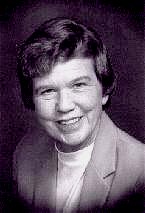Introduction
Words & Music: Natalie A. Sleeth, 1986 (🔊 pdf nwc).
HYMN OF PROMISE
© 1986 Hope Publishing Company
380 South Main Place, Carol Stream, IL 60188 (800-323-1049)
Used by permission.

All the promises of God.
2 Corinthians 1:20
Words & Music: Natalie A. Sleeth, 1986 (🔊 pdf nwc).
HYMN OF PROMISE
© 1986 Hope Publishing Company
380 South Main Place, Carol Stream, IL 60188 (800-323-1049)
Used by permission.

Sleeth wrote this selection in February 1985 as a choral anthem, and later adapted it as a hymn. She wrote that she was:
…pondering the death of a friend (life and death, death and resurrection), pondering winter and spring (seeming opposites), and a T. S. Eliot poem which had the phrase,
In our end is our beginning.These seemingly contradictorypairsled to the thesis of the song and the hopeful message that out of one will come the other whenever God chooses to bring that about.
Natalie’s husband, Dr. Ronald Sleeth, heard Hymn of Promise shortly before he died, and asked that it be sung at his funeral.
In the bulb there is a flower;
In the seed, an apple tree;
In cocoons, a hidden promise:
Butterflies will soon be free!
In the cold and snow of winter
There’s a spring that waits to be,
Unrevealed until its season,
Something God alone can see.
There’s a song in every silence,
Seeking word and melody;
There’s a dawn in every darkness,
Bringing hope to you and me.
From the past will come the future;
What it holds, a mystery,
Unrevealed until its season,
Something God alone can see.
In our end is our beginning;
In our time, infinity;
In our doubt there is believing;
In our life, eternity,
In our death, a resurrection;
At the last, a victory,
Unrevealed until its season,
Something God alone can see.

The words & music to this hymn are under copyright.
If you wish to print, copy, cut/paste or duplicate them, you must
obtain permission from Hope Publishing Company (800-323-1049).